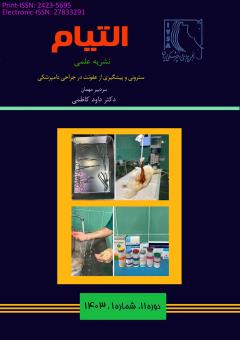اصول آماده سازی بیمار قبل از جراحی
محورهای موضوعی : علوم جراحی دامپزشکی شامل جراحی های بافت های سخت و نرمآيلار مشتاق 1 , سید حسین جارالمسجد 2
1 - گروه علوم درمانگاهی، دانشکده دامپزشکی، دانشگاه آزاد اسلامی واحد شبستر، شبستر، آذربایجان شرقی، ایران
2 - دانشیار جراحی دامپزشکی، گروه علوم درمانگاهی، دانشکده دامپزشکی دانشگاه تبریز، تبریز، آذربایجان شرقی، ایران.
کلید واژه: اصول آماده سازی, جراحی, بیهوشی,
چکیده مقاله :
زمینه و نوع مطالعه: مطالعه مروری اصول آماده سازی بیمار قبل از جراحی
هدف: بیان نحوه آماده سازی بیمار قبل از جراحی
روش کار: مطالعه مروری با استفاده از منابع مختلف منتشر شده در ارتباط با نحوه آماده سازی بیمار قبل از جراحی
نتایج: هدف اصلی در مراقبت و آماده سازی های قبل از جراحی، جلوگیری از آسیب به بیمار و ایمن نگه داشتن آن قبل از عمل، حین عمل و بعد از عمل است. روش جراحی ممکن است به همراه تجویز داروی بیهوشی یا بی حسی موضعی باشد که نیازمند گرفتن رضایت نامه کتبی از صاحب بیمار است. ارزیابی بیهوشی قبل از عمل، میزان خطر را برای همه ی بیماران به حداقل می رساند و همچنین بیماران در معرض خطر را شناسایی می کند. ملاحظات ویژه ای باید نسبت به بیماران سن پایین، باردار و مسنی که تحت بیهوشی و جراحی قرار می گیرند، اعمال شود. آماده سازی بیمار برای بیهوشی مستلزم درک وضعیت قبل عمل، ماهیت جراحی و تکنیک های بیهوشی مورد نیاز برای جراحی و همچنین خطراتی است که یک بیمار خاص ممکن است در این مدت با آن مواجه شود. بیماران دارای بیماری های زمینه ای نیاز به بررسی و هماهنگی دقیق تری دارند. آماده سازی برای جراحی ممکن است هفته ها طول بکشد و اگر به اندازه کافی و درست انجام نشود ممکن است باعث تاخیر و لغو جراحی شود. جراحی موفقیت آمیز نیاز به تشخیص صحیح، انتخاب روش و مواد جراحی مناسب، توجه به جزئیات، ابزار دقیق و تجهیزات مناسب دارد. ابزار دقیق و نخ بخیه مناسب باید قبل از هر عمل جراحی برنامه ریزی شده، تهیه شود و جراح قبل از اقدام به عمل جراحی از وضعیت آناتومی، روش كار و سایر الزامات آگاهی کافی داشته باشد. قبل از القای بیهوشی باید عدم تعادل مایعات، الکترولیت ها و اختلالات اسید و بازی اصلاح شود. در بیماران مبتلا به اختلال عملکرد کبدی متوسط تا شدید، باید از مصرف داروهایی كه تحت متابولیسم کبدی قرار می گیرند اجتناب شود و یا دوز مصرفی آن به طور قابل توجهی کاهش یابد. برای بررسی ناهنجاری های دستگاه گوارش انجام رادیوگرافی از ملزومات می باشد.
نتیجه گیری نهایی: پیش آمادگی (Prehabilitation) اصطلاحی است که به هر مداخله ای اطلاق می شود که قبل از جراحی برای کاهش عوارض ناشی از جراحی، کاهش طول مدت بستری در بیمارستان، تسریع بازگشت عملکرد اندام ها و تسهیل بازگشت بیمار به زندگی عادی انجام می شود.
Background: A review of the principles of preparation of surgical patient
Objectives: Explaining the principles of preparation of surgical patient
Methods: A literature review using various publications related to preparation of surgical patient
Results: The main goal in preoperative care and preparation of surgical patients is to prevent harm and keep the patient safe before, during, and after the operation. The surgical procedure may be accompanied by the administration of anesthetic or local analgesia, which requires written consent from the patient's owner. Preoperative anesthesia assessment minimizes the risk for all patients and also identifies patients at risk. Special considerations should be applied to young, pregnant and elderly patients who undergo anesthesia and surgery. Preparing the patient for anesthesia requires an understanding of the preoperative condition, the nature of the surgery, and the anesthetic techniques required for the surgery as well as the risks that a particular patient may face during this time. Patients with underlying diseases need more careful examination and coordination. Preparation for surgery can take weeks, and if not performed sufficiently and correctly, it can cause delays and cancellations of surgery. Successful surgery requires correct diagnosis, selection of appropriate surgical methods and materials, attention to detail, accurate instruments and appropriate equipment. Appropriate instruments and sutures should be prepared before any planned surgery, and the surgeon should have adequate knowledge of the anatomy, procedure, and other requirements before performing the surgery. Before induction of anesthesia, fluid, electrolyte, and acid-base imbalances should be corrected.
Many drugs that are routinely administered during anesthesia are metabolized by the liver. In diseases with moderate to severe liver dysfunction, such drugs should be avoided or their dosage should be significantly reduced. Radiography is necessary to check the abnormalities of the digestive system.
Conclusions: Prehabilitation is a term that refers to any intervention that is performed before surgery to reduce the complications caused by surgery, reduce the length of hospitalization, accelerate the return of organ function, and facilitate the patient's return to normal life.
